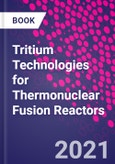Tritium Technologies for Thermonuclear Fusion Reactors summarizes the most recent research and practice in tritium technologies for the processing of hydrogen isotopes in fuel cycles. Authors Dr. Perevezentsev and Professor Rozenkevich combine their wealth of first-hand experience to present this comprehensive guide which promotes the best radiation protection practices and a more sustainable way to produce power in a thermonuclear reactor plant. Applicable to both magnetic and inertial confinements of plasma, this book covers tritium processing systems, tritium recovery from the plasma chamber, and various safety systems devoted to lessening the impact on the public and environment.
The readers are also led through various modeling techniques, such as the separation of hydrogen isotopes, and the detritiation of liquid and gaseous streams in dynamic and steady state operation modes. This book is a practical guide which includes various case studies and examples which will help solidify the reader's learning. It combines the latest research of tritium technologies with applications for fusion nuclear reactors, and includes solutions and directions for the resolution of various common challenges faced. Engineers, researchers, and students of tritium technologies, fusion energy, and nuclear power generation will gain a detailed and integrated understanding of how tritium can be used within a nuclear setting, for cleaner and more efficient power generation.
Please Note: This is an On Demand product, delivery may take up to 11 working days after payment has been received.
Table of Contents
1. Purpose of the fuel cycle for fusion reactor2. Fuel storage and supply3. Processing unburned plasma4. Separation of hydrogen isotopes5. Tritium recovery from components of plasma chamber6. Fuel cycle of fusion reactor protection of personnel, public and the environment7. Modelling of fuel cycle and safety systems








